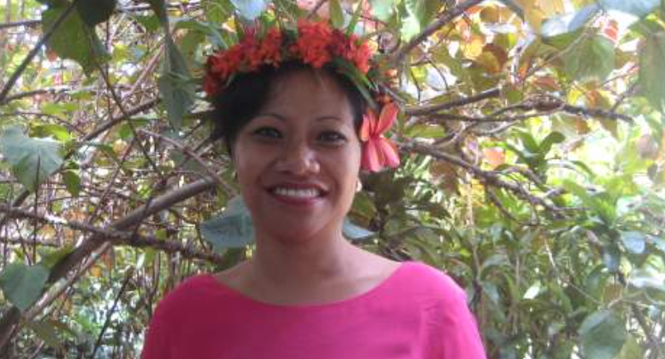
For Fine Tuitupou-Arnold, disasters are a part of everyday life. In her role as International Humanitarian Law Officer for the Cook Islands Red Cross Society (CIRCS), Tuitupou-Arnold has taken on responsibilities for both IHL and International Disaster Response Law (IDRL), and has become a disaster law champion in the region.
Tuitupou-Arnold started her career working at the Crown Law Office in Tonga, after which she moved to the Cook Islands to work at a private firm before joining the CIRCS. In her role as CIRCS IHL Officer, Tuitupou-Arnold has been disseminating information on IHL and the fundamental principles of the Red Cross and Red Crescent to raise awareness and respect for IHL in the Cook Islands. Fine was instrumental in establishing the Cook Islands National IHL Committee to assist the government in fulfilling its obligations on IHL Conventions and related matters.
Tuitupou-Arnold took the lead in preparing a report on legal preparedness for disasters in the Cook Islands, which examines the existing legal frameworks for disaster response in light of the IDRL Guidelines, and provides recommendations to the government on how to improve these systems. “In my experience, I see an immediate need for IDRL in the Cook Islands, and in the Pacific. It is a cross-cutting issue, affecting many areas of government, and it is everyone’s responsibility to be prepared for disasters”.
The Cook Islands Government has shown a strong commitment to improve disaster preparedness, as was highlighted at the recent IFRC-sponsored regional workshop on disaster law in Nadi, Fiji. The Director of Emergency Management Cook Islands, Mr. Charles Carlson, expressed his support for pursuing IDRL and emphasized the need to ensure that recommendations of Tuitupou-Arnold report are implemented effectively. As Tuitupou-Arnold observes, this could lead to an improvement in other areas of disaster risk management (DRM) as well. “If these recommendations are properly implemented, it could pave the way for legally preparing other aspects of DRM, such as disaster risk reduction”.
When asked why she thinks improving disaster laws is important, Tuitupou-Arnold highlighted that the Cook Islands almost always makes a request for international assistance in large disaster, given its isolated location and limited capacity to respond. “We are dealing with people’s lives here so, to be more effective, we need to be prepared in every aspect of disaster response, including being legally prepared to deal with whatever nature throws at us.”
Until now, facilitating international assistance in the Cook Islands has been done on an ad hoc basis. “There is now a real need to identify and produce a legal framework that supports good practice in disaster response”, Tuitupou-Arnold says, “in order to avoid wasting time and to overcome unnecessary barriers”.
Tuitupou-Arnold hopes to continue to work for the CIRCS in following up on the implementation of the recommendations from the IDRL report, and also in supporting the government on IHL. “I get real satisfaction knowing that what I do will benefit not just one client but a whole community of vulnerable people”.